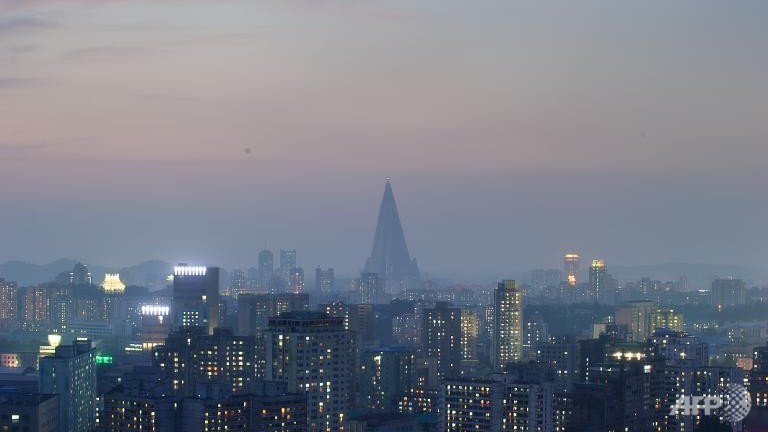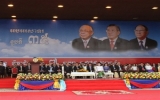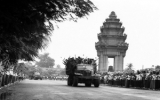N Korea rejects South proposal for family reunions
Update: 09-01-2014 | 00:00:00
North Korea on Thursday rejected a South Korean proposal for resuming reunions for families separated by the Korean War, citing planned South-US military exercises as a major barrier.
The North's main body for inter-Korean affairs said it would like to get the reunions going again, but questioned the South's sincerity.
 A general view of Pyongyang skyline. (AFP/Ed Jones)
"How could separated families comfortably meet for a reunion in the face of ceaseless war practices staged in the South?" the Committee for the Peaceful Reunification of Korea (CPRK) was quoted as saying by the North's official KCNA news agency.
South Korea and the United States conduct a series of joint military exercises of varying magnitude every year.
The drills are routinely condemned by the North as rehearsals for invasion.
Earlier this week, South Korean President Park Geun-hye had called for a family reunion event to be held around the time of the Lunar New Year on January 31.
In a press conference, Park said the reunion programme would provide new momentum to improving ties following years of high tensions.
A reunion had been scheduled for September last year but Pyongyang cancelled it at the last minute, blaming "hostility" from South Korea.
"In contrast to our genuine efforts, press experts and even government officials in the South made rude comments and displayed bad behaviour," the CPRK recalled in its message on Thursday to the South's Unification Ministry.
Seoul responded by expressing "regret" that Pyongyang had sought to link a humanitarian issue with the regular joint military exercises it conducts with the United States.
"The North should show sincerity through its actions, instead of talking about improving ties only with words," the Unification Ministry said.
Millions of Koreans were left separated by the Korean War, which sealed the peninsula's division. Most have died without having the chance to reunite with family members last seen six decades ago.
The reunion programme began in earnest in 2000 following an historic inter-Korean summit.
Sporadic events since then have seen around 17,000 people briefly reunited. The last such meeting took place in late 2010, before the programme was suspended in the wake of the North's shelling of the South Korean border island of Yeonpyeong.
About 72,000 South Koreans -- nearly half of them aged over 80 -- are still alive and wait-listed for a chance to join the highly competitive reunion events, which select only up to a few hundred participants each time.
In its message on Thursday, the CPRK also mentioned its frustration at the South's unwillingness to discuss "the proposals of our side" for improving cross-border ties.
Pyongyang has sought to link the family reunions to a resumption of South Korean tours to the North's Mount Kumgang resort -- a source of much needed hard currency.
The South suspended the tours in 2008 after a North Korean soldier shot dead a female tourist who strayed into a restricted zone. It insists their resumption should not be discussed alongside the family reunions.
"There is no change in our government's stance that the family reunion and the agenda proposed by the North are separate issues," the Unification Ministry said.
- AFP/nd
A general view of Pyongyang skyline. (AFP/Ed Jones)
"How could separated families comfortably meet for a reunion in the face of ceaseless war practices staged in the South?" the Committee for the Peaceful Reunification of Korea (CPRK) was quoted as saying by the North's official KCNA news agency.
South Korea and the United States conduct a series of joint military exercises of varying magnitude every year.
The drills are routinely condemned by the North as rehearsals for invasion.
Earlier this week, South Korean President Park Geun-hye had called for a family reunion event to be held around the time of the Lunar New Year on January 31.
In a press conference, Park said the reunion programme would provide new momentum to improving ties following years of high tensions.
A reunion had been scheduled for September last year but Pyongyang cancelled it at the last minute, blaming "hostility" from South Korea.
"In contrast to our genuine efforts, press experts and even government officials in the South made rude comments and displayed bad behaviour," the CPRK recalled in its message on Thursday to the South's Unification Ministry.
Seoul responded by expressing "regret" that Pyongyang had sought to link a humanitarian issue with the regular joint military exercises it conducts with the United States.
"The North should show sincerity through its actions, instead of talking about improving ties only with words," the Unification Ministry said.
Millions of Koreans were left separated by the Korean War, which sealed the peninsula's division. Most have died without having the chance to reunite with family members last seen six decades ago.
The reunion programme began in earnest in 2000 following an historic inter-Korean summit.
Sporadic events since then have seen around 17,000 people briefly reunited. The last such meeting took place in late 2010, before the programme was suspended in the wake of the North's shelling of the South Korean border island of Yeonpyeong.
About 72,000 South Koreans -- nearly half of them aged over 80 -- are still alive and wait-listed for a chance to join the highly competitive reunion events, which select only up to a few hundred participants each time.
In its message on Thursday, the CPRK also mentioned its frustration at the South's unwillingness to discuss "the proposals of our side" for improving cross-border ties.
Pyongyang has sought to link the family reunions to a resumption of South Korean tours to the North's Mount Kumgang resort -- a source of much needed hard currency.
The South suspended the tours in 2008 after a North Korean soldier shot dead a female tourist who strayed into a restricted zone. It insists their resumption should not be discussed alongside the family reunions.
"There is no change in our government's stance that the family reunion and the agenda proposed by the North are separate issues," the Unification Ministry said.
- AFP/nd
 A general view of Pyongyang skyline. (AFP/Ed Jones)
"How could separated families comfortably meet for a reunion in the face of ceaseless war practices staged in the South?" the Committee for the Peaceful Reunification of Korea (CPRK) was quoted as saying by the North's official KCNA news agency.
South Korea and the United States conduct a series of joint military exercises of varying magnitude every year.
The drills are routinely condemned by the North as rehearsals for invasion.
Earlier this week, South Korean President Park Geun-hye had called for a family reunion event to be held around the time of the Lunar New Year on January 31.
In a press conference, Park said the reunion programme would provide new momentum to improving ties following years of high tensions.
A reunion had been scheduled for September last year but Pyongyang cancelled it at the last minute, blaming "hostility" from South Korea.
"In contrast to our genuine efforts, press experts and even government officials in the South made rude comments and displayed bad behaviour," the CPRK recalled in its message on Thursday to the South's Unification Ministry.
Seoul responded by expressing "regret" that Pyongyang had sought to link a humanitarian issue with the regular joint military exercises it conducts with the United States.
"The North should show sincerity through its actions, instead of talking about improving ties only with words," the Unification Ministry said.
Millions of Koreans were left separated by the Korean War, which sealed the peninsula's division. Most have died without having the chance to reunite with family members last seen six decades ago.
The reunion programme began in earnest in 2000 following an historic inter-Korean summit.
Sporadic events since then have seen around 17,000 people briefly reunited. The last such meeting took place in late 2010, before the programme was suspended in the wake of the North's shelling of the South Korean border island of Yeonpyeong.
About 72,000 South Koreans -- nearly half of them aged over 80 -- are still alive and wait-listed for a chance to join the highly competitive reunion events, which select only up to a few hundred participants each time.
In its message on Thursday, the CPRK also mentioned its frustration at the South's unwillingness to discuss "the proposals of our side" for improving cross-border ties.
Pyongyang has sought to link the family reunions to a resumption of South Korean tours to the North's Mount Kumgang resort -- a source of much needed hard currency.
The South suspended the tours in 2008 after a North Korean soldier shot dead a female tourist who strayed into a restricted zone. It insists their resumption should not be discussed alongside the family reunions.
"There is no change in our government's stance that the family reunion and the agenda proposed by the North are separate issues," the Unification Ministry said.
- AFP/nd
A general view of Pyongyang skyline. (AFP/Ed Jones)
"How could separated families comfortably meet for a reunion in the face of ceaseless war practices staged in the South?" the Committee for the Peaceful Reunification of Korea (CPRK) was quoted as saying by the North's official KCNA news agency.
South Korea and the United States conduct a series of joint military exercises of varying magnitude every year.
The drills are routinely condemned by the North as rehearsals for invasion.
Earlier this week, South Korean President Park Geun-hye had called for a family reunion event to be held around the time of the Lunar New Year on January 31.
In a press conference, Park said the reunion programme would provide new momentum to improving ties following years of high tensions.
A reunion had been scheduled for September last year but Pyongyang cancelled it at the last minute, blaming "hostility" from South Korea.
"In contrast to our genuine efforts, press experts and even government officials in the South made rude comments and displayed bad behaviour," the CPRK recalled in its message on Thursday to the South's Unification Ministry.
Seoul responded by expressing "regret" that Pyongyang had sought to link a humanitarian issue with the regular joint military exercises it conducts with the United States.
"The North should show sincerity through its actions, instead of talking about improving ties only with words," the Unification Ministry said.
Millions of Koreans were left separated by the Korean War, which sealed the peninsula's division. Most have died without having the chance to reunite with family members last seen six decades ago.
The reunion programme began in earnest in 2000 following an historic inter-Korean summit.
Sporadic events since then have seen around 17,000 people briefly reunited. The last such meeting took place in late 2010, before the programme was suspended in the wake of the North's shelling of the South Korean border island of Yeonpyeong.
About 72,000 South Koreans -- nearly half of them aged over 80 -- are still alive and wait-listed for a chance to join the highly competitive reunion events, which select only up to a few hundred participants each time.
In its message on Thursday, the CPRK also mentioned its frustration at the South's unwillingness to discuss "the proposals of our side" for improving cross-border ties.
Pyongyang has sought to link the family reunions to a resumption of South Korean tours to the North's Mount Kumgang resort -- a source of much needed hard currency.
The South suspended the tours in 2008 after a North Korean soldier shot dead a female tourist who strayed into a restricted zone. It insists their resumption should not be discussed alongside the family reunions.
"There is no change in our government's stance that the family reunion and the agenda proposed by the North are separate issues," the Unification Ministry said.
- AFP/nd
 Malaysia's digital economy projected to reach 31 billion USD in 2024
Malaysia's digital economy projected to reach 31 billion USD in 2024
 Opportunity to enhance the position of the Global South
Opportunity to enhance the position of the Global South
 Thailand to build new bridge to Cambodia
Thailand to build new bridge to Cambodia
 Bulgaria charts new course with Vietnam on President’s upcoming visit: Diplomat
Bulgaria charts new course with Vietnam on President’s upcoming visit: Diplomat
 Seminar seeks ways to boost ASEAN - Latin America connectivity
Seminar seeks ways to boost ASEAN - Latin America connectivity
 Indonesia seeks India's help in health education
Indonesia seeks India's help in health education
 Indonesia named world's most generous country in 2024
Indonesia named world's most generous country in 2024
 Philippines: Over-4m-high floodwaters make thousands of houses submerged
Philippines: Over-4m-high floodwaters make thousands of houses submerged
 Singapore’s public sector records carbon reduction in 2023
Singapore’s public sector records carbon reduction in 2023
 Pressure facing the EU on its growth track
Pressure facing the EU on its growth track



